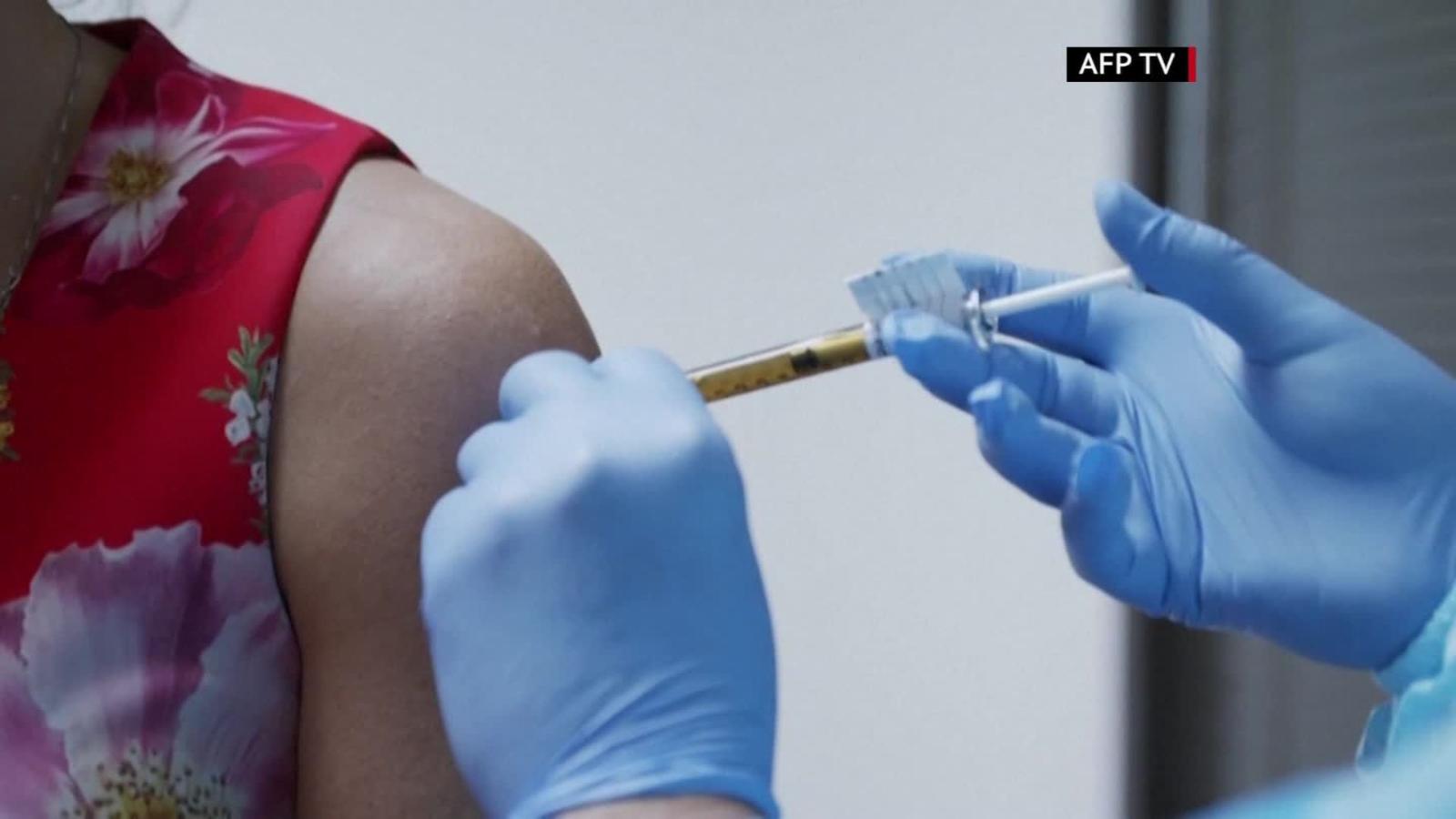Which countries in Latin America are affected by the suspension of vaccine trials?
1:10
(Kaiser Health News) -
The U.S. Food and Drug Administration (FDA) is weighing whether it should follow up with British regulators to resume a coronavirus vaccine trial.
The tests were stopped when a participant suffered spinal cord damage.
The National Institutes of Health (NIH) have launched an investigation into the case.
"Higher NIH levels are very concerned," said Dr. Avindra Nath, intramural clinical director and viral research leader at the National Institute of Neurological Disorders and Stroke, a division of the NIH.
"Everyone's hopes are on a vaccine, and if they have a major complication, everything could go off the rails."
Great uncertainty remains about what happened to the unidentified patient, much to the frustration of those who are avidly following the progress of vaccine trials.
AstraZeneca, which is running the global trial of the vaccine in conjunction with the University of Oxford, said the trial volunteer recovered from severe spinal cord inflammation and is no longer hospitalized.
Why did AstraZeneca suspend its study of the COVID-19 vaccine and what does it mean?
Dr. Huerta explains the reverse to AstraZeneca vaccine 6:23
Side effects of the vaccine
AstraZeneca has not confirmed that the patient had transverse myelitis, but Nath and another neurologist said they understood that was the case.
Transverse myelitis produces a set of symptoms that involve inflammation along the spinal cord that can cause pain, muscle weakness, and paralysis.
Britain's regulatory body, the Medicines and Health Products Regulatory Agency, reviewed the case and allowed the trial to resume in the UK.
AstraZeneca "needs to be more forthcoming about a possible complication from a vaccine that will eventually be given to millions of people," said Nath.
"We would like to see how we can help, but the lack of information makes it difficult to do so."
Any decision about whether to continue the trial is complex because it is difficult to assess the cause of a rare injury that occurs during a vaccine trial.
Also, because scientists and authorities have to weigh the risk of rare side effects against a vaccine that could slow the pandemic.
"Many factors go into these decisions," Nath said.
I'm sure everything is on the table.
The last thing you want to do is hurt healthy people.
MIRA: Spain will produce the Novavax covid-19 vaccine for all of Europe
The NIH has yet to obtain tissue or blood samples from the British patient, and their research is "in the planning stages," Nath said.
American scientists could test samples from other vaccinated patients to see if any of the antibodies they generated in response to the coronavirus also attack brain or spinal cord tissue.
Such studies could take a month or two, he said.
The FDA declined to comment on how long it would take before deciding whether to move forward.
What is an emergency use authorization and what does it have to do with how quickly we will get a coronavirus vaccine?
AstraZeneca could present vaccine to regulators this year 1:37
Should the trial continue?
Dr Jesse Goodman, a Georgetown University professor and physician who was the FDA's chief scientist and chief vaccine regulator during the Obama administration, said the agency will review the data and possibly consult with British regulators before allowing the resumption. of the study in the United States.
The study had just started in the country when the injury was reported.
Two other coronavirus vaccines are also in late-stage trials in the United States.
If the injury in the British trial is determined to be caused by the vaccine, the FDA could stop the trial.
If you allow it to resume, regulators and scientists will surely be on the lookout for similar symptoms in other trial participants.
A volunteer in an earlier phase of the AstraZeneca trial experienced a similar side effect, but the researchers found she had multiple sclerosis that was not related to the vaccine, according to Dr. Elliot Frohman, director of the Center for Multiple Sclerosis and Neuroimmunology at the University of Texas.
Neurologists who study diseases like transverse myelitis say they are rare (occurring at a rate of perhaps 1 in 250,000 people).
It most often attacks as a result of the body's immune response to a virus.
Less commonly, these episodes have also been linked to vaccines.
"Molecular mimicry"
The precise cause of the disease is key to the authorities' decision to resume the trial.
Sometimes a person's immune response to the vaccine "unmasks" an underlying medical condition, leading to disease.
This was the case with the multiple sclerosis patient.
In that case, the trial could continue without fear, because the disease was not specific to the vaccine.
More troubling is a phenomenon called "molecular mimicry."
In such cases, a small portion of the vaccine may resemble tissue in the brain or spinal cord, resulting in an immune attack on that tissue in response to a component of the vaccine.
If that were the case, another onset of transverse myelitis would be likely if the trial was resumed, said Dr. William Schaffner, an infectious disease specialist at Vanderbilt University School of Medicine.
A second case would close the trial, he said.
LOOK: Experts warn that the approval process for covid-19 vaccines should be kept out of the fast track
The Possible Risk of Vaccines
In 1976, a massive swine flu vaccination program came to a halt when doctors began diagnosing a similar disorder, Guillain-Barré syndrome (GBS).
This syndrome occurred in people who received the vaccine.
No one knew at the time how common GBS was, so it was difficult to know whether the episodes were related to the vaccine.
Over time, the scientists found that the vaccine increased the risk of developing the disorder by one additional case for every 100,000 vaccinated patients.
Typical seasonal flu vaccination increases the risk of getting GBS by about one additional case in every one million people.
"It's very, very difficult" to determine if a rare event was caused by a vaccine, Schaffner said.
"How do you attribute an increased risk of something that occurs in one in a million people?"
Before allowing trials to restart in the United States, the FDA will want to see why the company and an independent data and safety monitoring board (DSMB) in the UK felt it was safe to continue, Goodman said.
The AstraZeneca trial in the United States has a separate safety board.
The FDA will need to review all the details of the case and may request more information about the affected study volunteer before deciding whether to allow the trial to continue in the United States, Goodman said.
They may also require AstraZeneca to update the safety information it provides to study participants.
It's possible the volunteer's health problem was a coincidence not related to the vaccine, said Dr. Amesh Adalja, a senior scholar at the Johns Hopkins Center for Health Safety.
Studies don't usually stop for a single health problem, even a serious one.
Experts ask for more information about the trials
However, many healthcare leaders have expressed frustration that AstraZeneca has not released further information on the health issue that led it to stop its UK trial.
"There is so little information on this that it is impossible to understand what the diagnosis was or why the DSMB and the sponsor were reassured" that it was safe to continue, Goodman said.
AstraZeneca has said it cannot provide further information on the health issue, saying this would violate patient privacy, although it did not say how.
But there is an exceptional need for transparency in a political climate plagued by vaccine vacillation.
There is also mistrust in the Trump administration's handling of the response to COVID-19, leading scientists say.
"While I respect the critical need for patient confidentiality, I think it would be really helpful to know what their assessment of these issues was," Goodman said.
«What was the diagnosis?
If there was no clear diagnosis, what led you to think that the trial could be restarted?
There is so much potential interest and concern about a COVID-19 vaccine that the more information you can always get, the more reassuring it would be. '
Plan B: Support for Six More Vaccines
The FDA will have to balance the possible risks of an experimental vaccine with the danger posed by Covid-19, which has killed nearly 200,000 people in the United States.
"There are also potential consequences if you stop a study," Goodman said.
If the AstraZeneca vaccine fails, the United States government is supporting six other covid-19 vaccines.
This in the hope that at least one will be successful.
The potential problems with the AstraZeneca vaccine show that this is a smart investment, Adalja said.
"This is part of the idea of not having a single vaccine candidate in the future," he said.
"It gives you a little more security."
Schaffner said researchers must remember that vaccine research is unpredictable.
"Researchers have been inadvertently promoting their own vaccine," Schaffner said.
"The Oxford researchers were there this summer saying, 'We're going to get there first.'
But this is exactly the kind of argument for the… that Dr. [Anthony] Fauci and the rest of us have been saying, 'You never know what will happen once you do large-scale human trials.'
- KHN (Kaiser Health News) is a non-profit news service that covers health topics. It is an editorially independent program of KFF (Kaiser Family Foundation) that is not affiliated with Kaiser Permanente.
Coronavirus Vaccine















